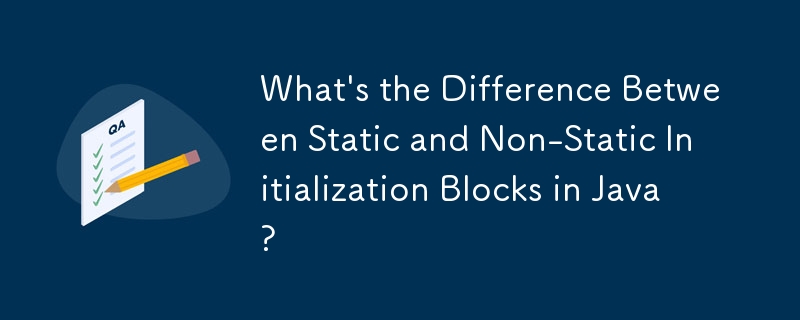 Java
Java
 javaTutorial
javaTutorial
 What's the Difference Between Static and Non-Static Initialization Blocks in Java?
What's the Difference Between Static and Non-Static Initialization Blocks in Java?
What's the Difference Between Static and Non-Static Initialization Blocks in Java?

Static vs. Non-Static Initialization Code Blocks
The distinction between static and non-static initialization code blocks in Java relates to their execution and scope within a class.
Static Initialization Blocks
A static initialization block, denoted by the static keyword, is executed upon class loading. These blocks are used to initialize static class members, such as constants or static variables, and are executed in the order they are defined. The example provided demonstrates a static initialization block that initializes a static final field and invokes a static method.
Non-Static Initialization Blocks
In contrast, a non-static initialization block (also known as an instance initializer) is executed upon object instantiation. These blocks are used to initialize instance members, such as non-static variables or fields, and are executed after the superclass constructor is called but before the object's own constructor.
Purpose and Usage
Static initialization blocks are typically used for operations that should occur only once when the class is loaded, such as initializing class-wide resources or performing one-time setup tasks. Non-static initialization blocks, on the other hand, are used for initializing instance-specific data or performing operations that occur for each instance of the class.
Access to Variables
A static initialization block can access static class members, including static variables and methods. However, it cannot access non-static instance members, as these are only available within the context of an object. Conversely, a non-static initialization block can access both static and non-static members of the class.
Conclusion
Understanding the difference between static and non-static initialization code blocks is essential for effectively initializing and managing data within Java classes. Static initialization blocks provide a convenient way to initialize class-wide resources, while non-static initialization blocks facilitate the initialization of instance-specific data.
The above is the detailed content of What's the Difference Between Static and Non-Static Initialization Blocks in Java?. For more information, please follow other related articles on the PHP Chinese website!

Hot AI Tools

Undresser.AI Undress
AI-powered app for creating realistic nude photos

AI Clothes Remover
Online AI tool for removing clothes from photos.

Undress AI Tool
Undress images for free

Clothoff.io
AI clothes remover

Video Face Swap
Swap faces in any video effortlessly with our completely free AI face swap tool!

Hot Article

Hot Tools

Notepad++7.3.1
Easy-to-use and free code editor

SublimeText3 Chinese version
Chinese version, very easy to use

Zend Studio 13.0.1
Powerful PHP integrated development environment

Dreamweaver CS6
Visual web development tools

SublimeText3 Mac version
God-level code editing software (SublimeText3)

Hot Topics
 Is the company's security software causing the application to fail to run? How to troubleshoot and solve it?
Apr 19, 2025 pm 04:51 PM
Is the company's security software causing the application to fail to run? How to troubleshoot and solve it?
Apr 19, 2025 pm 04:51 PM
Troubleshooting and solutions to the company's security software that causes some applications to not function properly. Many companies will deploy security software in order to ensure internal network security. ...
 How to simplify field mapping issues in system docking using MapStruct?
Apr 19, 2025 pm 06:21 PM
How to simplify field mapping issues in system docking using MapStruct?
Apr 19, 2025 pm 06:21 PM
Field mapping processing in system docking often encounters a difficult problem when performing system docking: how to effectively map the interface fields of system A...
 How to elegantly obtain entity class variable names to build database query conditions?
Apr 19, 2025 pm 11:42 PM
How to elegantly obtain entity class variable names to build database query conditions?
Apr 19, 2025 pm 11:42 PM
When using MyBatis-Plus or other ORM frameworks for database operations, it is often necessary to construct query conditions based on the attribute name of the entity class. If you manually every time...
 How do I convert names to numbers to implement sorting and maintain consistency in groups?
Apr 19, 2025 pm 11:30 PM
How do I convert names to numbers to implement sorting and maintain consistency in groups?
Apr 19, 2025 pm 11:30 PM
Solutions to convert names to numbers to implement sorting In many application scenarios, users may need to sort in groups, especially in one...
 How does IntelliJ IDEA identify the port number of a Spring Boot project without outputting a log?
Apr 19, 2025 pm 11:45 PM
How does IntelliJ IDEA identify the port number of a Spring Boot project without outputting a log?
Apr 19, 2025 pm 11:45 PM
Start Spring using IntelliJIDEAUltimate version...
 How to safely convert Java objects to arrays?
Apr 19, 2025 pm 11:33 PM
How to safely convert Java objects to arrays?
Apr 19, 2025 pm 11:33 PM
Conversion of Java Objects and Arrays: In-depth discussion of the risks and correct methods of cast type conversion Many Java beginners will encounter the conversion of an object into an array...
 E-commerce platform SKU and SPU database design: How to take into account both user-defined attributes and attributeless products?
Apr 19, 2025 pm 11:27 PM
E-commerce platform SKU and SPU database design: How to take into account both user-defined attributes and attributeless products?
Apr 19, 2025 pm 11:27 PM
Detailed explanation of the design of SKU and SPU tables on e-commerce platforms This article will discuss the database design issues of SKU and SPU in e-commerce platforms, especially how to deal with user-defined sales...
 How to elegantly get entity class variable name building query conditions when using TKMyBatis for database query?
Apr 19, 2025 pm 09:51 PM
How to elegantly get entity class variable name building query conditions when using TKMyBatis for database query?
Apr 19, 2025 pm 09:51 PM
When using TKMyBatis for database queries, how to gracefully get entity class variable names to build query conditions is a common problem. This article will pin...





